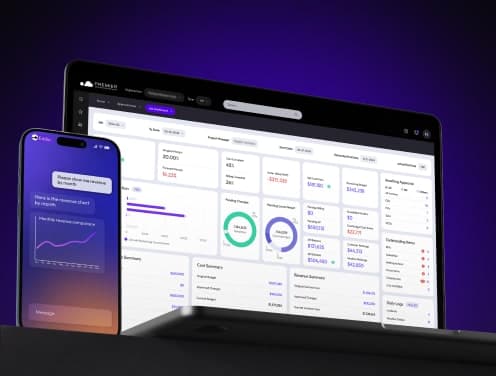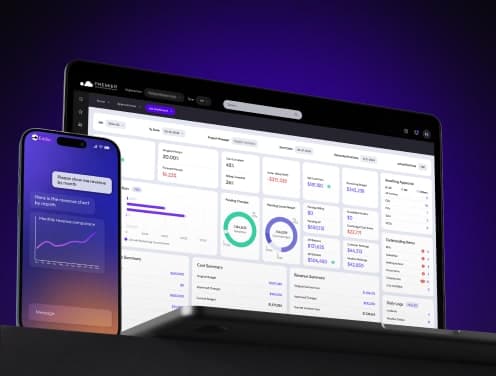
8 Tested CMiC Alternatives for Better Construction Management
Need a better alternative to CMiC? You're not the only one. Construction professionals often struggle with their current management software and want to find something that works better.
CMiC provides comprehensive construction project management - from budgeting and forecasting to change orders and document control. However, several alternatives offer unique benefits that deserve attention. Procore stands out as a strong option that serves over 16,000 customers and 2 million users across 150+ countries. Their user satisfaction sits at an impressive 89% based on nearly 7,000 reviews.
The software market for construction management has changed significantly. Fieldwire brings a user-friendly mobile experience, while ConstructionOnline's platform serves over 850,000 professionals. These CMiC alternatives pack features that could match your needs better. Small teams watching their budget might prefer Contractor Foreman, which costs just $49/month for the whole company and operates in more than 75 countries.
Let's explore eight tested options that could change how you run construction projects. These solutions help teams line up their efforts and deliver projects on schedule and within budget.
Premier Construction Software
Premier Construction Software stands out as a leading CMiC alternative with its all-in-one cloud-based construction management platform. Rated #1 Cloud ERP by Forbes Advisor for three consecutive years, this construction management platform combines powerful financial tools and optimized project management capabilities.
Premier Construction Software Key Features
Premier offers a complete suite of integrated tools built for construction companies:
- Unified Platform Integration: The system works as a true single-platform solution, you won't need multiple disconnected systems. This creates optimized workflows between accounting and project management functions.
- Advanced Financial Tools: The platform has consolidated financials, multi-currency support, P&L reports, and cash flow management with real-time budgeting and forecasting.
- AI-Powered Automation: Administrative work reduces by a lot through automated invoices, change orders, and approval workflows. Our AI construction software includes universal search that scans all files and data tables, plus "Eddie AI-Assistant" that alerts you to problems.
- Complete Project Oversight: The system shows centralized dashboards with KPIs, at-risk items, approvals, and financial summaries in one screen, you can drill down instantly.
- Multi-Entity Management: Users can handle multiple entities and projects from a single dashboard, including consolidated financial reports and intercompany transactions.
- Mobile Field Access: The platform makes shared work possible from both office and field with uninterrupted mobile connectivity at an additional cost of $50/user/month.
Premier Construction Software Pros and Cons
Pros:
- Paperless documentation with optimized workflows
- Strong customer service team with responsive support
- Project management and accounting merge naturally
- Cloud-based system that reduces clicks by approximately 80% compared to server-based alternatives
- Project managers save 10-12 hours weekly through integrated approvals and signatures
Cons:
- Limited mobile app capabilities
- No built-in scheduling component
- Some users report challenging implementation period
- High implementation fees might not suit smaller companies
- Learning curve is steep during original setup phase
Premier Construction Software Pricing
Premier's pricing structure varies based on company size and needs:
Plan | Monthly Cost Per User | Implementation Fee |
Starter | $249 | Starting at $15,000 |
Premium | $149 | Starting at $25,000 |
Enterprise | $125 | Starting at $50,000 |
The implementation fee covers system setup, data migration, configuration, and original training. The costs are higher than some alternatives but reflect Premier's all-encompassing onboarding approach and dedicated support team's construction industry experience.
Premier Construction Software Best For
Premier works best for:
- General Contractors: This is especially true when managing multiple complex projects that need complete financial visibility.
- Developers and Homebuilders: Companies in residential construction that need optimized operations and automated approval workflows.
- Specialty Contractors: Firms that need precise job costing and forecasting capabilities.
- Mid-to-Large Construction Enterprises: Organizations with 25+ employees that need flexible solutions, the Enterprise plan offers the most cost-effective per-user pricing for larger teams.
- Companies Wanting United Operations: Businesses tired of juggling multiple software systems that want a single source of truth for all project data.
Premier excels where other CMiC alternatives fall short, especially when you have organizations that need both strong accounting functionality and field management tools. The construction accounting platform suits companies that have outgrown simple solutions but don't want to piece together multiple systems.
Users praise how Premier eliminates the need to create multiple Excel reports, with one user noting efficiency increases "tenfold" after implementation. The platform grows with your business without requiring additional headcount, which makes it perfect for expanding operations.
Procore
Many industry experts call Procore the leading CMiC alternative. The platform offers a detailed cloud-based construction management solution that brings together everyone involved in your projects. Used in over 150 countries with more than 3 million projects completed successfully, this solution has gained remarkable acceptance among construction professionals.
Procore Key Features
Procore provides a versatile toolset built for construction teams throughout project execution:
- Unified Project Management: Teams can close communication gaps with mobile collaboration tools built for field use. This helps them understand daily priorities and prevent rework.
- Real-Time Information Access: The cloud-based platform ensures all stakeholders can access the latest information from a central location using any device.
- Financial Management Tools: Users can track potential changes, manage risk, handle forecasting, and move information naturally into accounting systems right from the field.
- Advanced Analytics: The platform has improved with Construction BI and INDUS.AI acquisitions. These additions bring machine learning and artificial intelligence capabilities that offer predictive insights without human intervention.
- Unlimited Collaboration: The platform supports over 2 million users on projects of all sizes. It includes contractor-specific features for general contractors, specialty contractors, and owners.
- Extensive Integrations: Users can connect with 500+ out-of-the-box integrations through the Procore App Marketplace. This eliminates any need to leave the platform.
Procore Pros and Cons
Pros:
- The unlimited users model enables full project team collaboration without extra costs
- Mobile access enables quick field updates and live communication
- Project data stays in one place, which reduces miscommunications and errors
- Users get free training through 18 on-demand, role-based certifications
- Processes RFIs and submittals 8 days faster on average
- General contractors save about 15 days per project
Cons:
- Users without technical backgrounds face a steeper learning curve
- The cost runs higher than some alternatives
- Some users report occasional system slowdowns
- The search functionality draws criticism from some users
- Customization options remain limited for specific needs
- The original setup requires careful attention to avoid issues
Procore Pricing
Procore's pricing model stands out by using Annual Construction Volume (ACV) instead of per-user licensing:
Aspect | Details |
Pricing Basis | Annual Construction Volume (total dollar value across projects) |
Contract Structure | Upfront annual fee based on selected products and construction volume |
User Access | Unlimited users included at no extra cost |
Additional Benefits | Unlimited data storage, 24/7 support, product enhancements |
Pricing Options | Project Management Basic ($375/month) to Full Suite ($549/month) |
Enterprise Costs | Over 2,000 customers pay more than $100,000 annually |
You'll need to contact Procore directly for exact costs since pricing adapts to your specific requirements and construction volume.
Procore Best For
- Mid-to-Large Construction Companies: Organizations with substantial construction volume can spread costs effectively.
- General Contractors: GCs make up 61% of Procore's total annual recurring revenue. They get specialized tools for managing subcontractors and project oversight.
- Companies Seeking Collaboration: Teams that want to connect field and office personnel with external partners like subcontractors and designers.
- Multi-Project Managers: Organizations running several complex projects at once benefit from united oversight.
- Technology-Forward Teams: Companies ready to welcome digital transformation with AI-powered insights and predictive analytics.
Procore excels at improving field-to-office communication, with 90% of surveyed customers confirming this benefit. The unlimited user model sets it apart from other CMiC alternatives by encouraging full participation without worrying about per-seat licensing costs.
Fieldwire
Fieldwire stands out as a field-focused CMiC alternative that puts construction teams' field needs first. Over 1,000,000 projects worldwide use this platform to help teams communicate and coordinate whatever their location.
Fieldwire Key Features
The platform offers a powerful field-oriented toolkit that makes daily construction tasks easier:
- Mobile-First Experience: The platform works offline and syncs automatically when reconnected. Field personnel can access current information even without internet because it's built specifically for on-site use.
- Plan Management: Teams can upload, view, annotate, and share blueprints from any device. Automatic version control keeps everyone on the latest drawings. The system splits specification books into team-specific sections automatically for better navigation.
- Task Management System: Teams can create, assign, and track tasks with priorities, due dates, categories, and locations. This saves field professionals an average of one hour per day. Users can link tasks directly to plan locations for visual context.
- Efficient Documentation: The platform generates detailed reports instantly and eliminates hours of manual paperwork. Reports can run on schedule - like sending open electrical tasks to subcontractors every Monday.
- Project Management Tools: The platform manages RFIs, submittals, and change orders (higher-tier plans only). Features include automatic extraction of submittals from specifications.
Fieldwire Pros and Cons
Pros:
- An accessible interface that needs minimal training, unlike complex alternatives
- Field-optimized mobile apps for iOS and Android work offline
- Plans update automatically when revisions occur and create accessible revision records
- Task management system saves an hour daily per craftsperson
- One customer saved $35,000 on printing expenses alone
Cons:
- Phone and computer synchronization can run slow
- Image search and filtering options need improvement
- Users find exporting plans challenging
- Advanced project management features need higher-tier plans
- Pro users find the fee structure confusing
Fieldwire Pricing
The platform comes with tiered pricing and offers both monthly and annual payment options:
Plan | Annual Price (per user) | Monthly Price (per user) | Key Features |
Basic | Free | Free | |
Pro | $39/month | $54/month | Adds reports, sheet compare, custom task statuses |
Business | $59/month | $74/month | Adds custom forms, integrations, BIM viewer |
Business Plus | $89/month | $104/month | Adds RFIs, submittals, change orders |
Note: The prices shown are per-user costs with annual billing. Custom contracts offer enterprise options with unlimited users, API access, and dedicated support.
Fieldwire Best For
- General and Specialty Contractors: These professionals make up 61% of Fieldwire's user base and benefit from the field-first approach and task management capabilities.
- Small to Medium Teams: The free Basic plan and affordable Pro tier make the platform available to smaller organizations that need essential functionality.
- Field-Heavy Operations: Teams focused on on-site productivity benefit most from the mobile-optimized interface and offline capabilities.
- Project Teams Needing Simple Documentation: Organizations that want straightforward quality control, inspections, and defect documentation without complex setup.
- Companies Transitioning from Paper: The platform's accessible interface makes adoption easier for businesses moving away from paper-based processes.
Fieldwire makes field operations simpler with practical tools that focus on real-life construction needs. Field teams save about 15 hours weekly on administrative tasks. The platform's usability gets favorable ratings from 90% of reviewers, making it available to less tech-savvy team members.
Buildertrend
Buildertrend has made its mark in residential construction by helping over 1 million users worldwide with its all-in-one management solution. This platform combines every part of residential project delivery to give home builders, remodelers, and specialty contractors a direct CMiC alternative.
Buildertrend Key Features
Buildertrend offers a complete toolkit that puts residential construction needs first:
- Two-Way Accounting Integration: The platform smoothly connects with QuickBooks and Xero to transfer job-specific expenses between systems. This makes job costing accurate without entering data twice.
- Client Portal Access: Homeowners get their own login to check daily progress, see shared documents, and stay in the loop throughout their project. This openness builds trust and cuts down on back-and-forth communication.
- Mobile Document Scanning: Teams can scan, upload, and find documents right from the field with unlimited cloud storage. Paper files become unnecessary as everything stays digital and easy to access.
- Financial Management Suite: The system handles all money movements with tools for budgeting, invoicing, purchase orders, client payments, and subcontractor payments on higher-tier plans. Users can track their budget in real time.
- Task Management System: Team members, subcontractors, and clients get To-Do items to track their responsibilities and progress. Everyone knows what they need to do and when.
- Business Insights Reporting: The platform uses informed tools to show project performance, budgeting, and client management in real time. These reports help spot ways to grow the business.
Buildertrend Pros and Cons
Pros:
- Mobile app works just as well as the desktop version, with photo notes and task creation
- Homeowners can pay directly through the client portal
- All plans support unlimited users
- Documents stay organized in the cloud
- Financial tools work smoothly with accounting systems
Cons:
- Users find the interface less user-friendly with a steep learning curve
- Trade partners and vendors often resist using the platform
- Windows don't resize and there's no auto-save
- Some features like the iPhone time clock seem overcomplicated
- Costs more than similar options
Buildertrend Best For
- Residential Builders: Home builders managing custom construction projects will find tools made just for them.
- Remodeling Contractors: The system supports renovation work with built-in client communication tools.
- Specialty Contractors: Trade-specific features help manage projects from start to finish.
- Teams Needing Client Engagement: Companies that want to keep homeowners in the loop will love the Customer Portal.
- Small to Mid-Sized Companies: Smaller construction teams handling residential projects will benefit more than large commercial operations.
Users say Buildertrend might not match CMiC's speed in some areas, calling it "more innovative" but "less reliable". Still, contractors who focus on residential projects often choose it for its specialized features.
ConstructionOnline
ConstructionOnline by UDA Technologies stands out as a game-changer against CMiC with its award-winning platform. The platform manages $85 billion worth of construction projects daily, and it earned over 40 top product awards.
ConstructionOnline Key Features
ConstructionOnline brings tools built specifically for construction professionals:
- TrueVision Business Intelligence: Learns from ground project data to help make better decisions. Project Scorecard and Employee Scorecard help track how productive teams are.
- Integrated Financial Tools: Takes care of estimating, change orders, client selections, and works with QuickBooks. OnCost estimating system breaks down costs to budget accurately.
- Scheduling & Calendar Management: The platform uses Gantt-chart scheduling with baseline tracking to compare planned versus actual timelines. GamePlan task lists help create accountability.
- Project Tracking: Daily logs, punch lists, warranty tracking, and to-do lists help monitor progress as projects move forward.
- Document Management: RFI tracking, submittals, and transmittals keep documentation in order. Redline Planroom lets teams mark up and annotate plans directly.
- Mobile Accessibility: Teams can access critical information anywhere through the ConstructionOnline Mobile app.
ConstructionOnline Pros and Cons
Pros:
- Customer service scores 4.8/5 from 573 reviews
- All tools come together in one central platform
- Great value for money at 4.4/5
- Cloud-based system that syncs with desktop
- Higher-tier plans come with unlimited file storage
Cons:
- Some users find the screen layout challenging
- Project notices might end up in junk mail
- Certain features have an overly complex interface
- Google Calendar sync works one way only
- Full functionality needs two separate programs
ConstructionOnline Pricing
The platform's pricing varies by industry with multiple tiers:
Industry | Pro Plan | Team Plan | Business Plan | Enterprise Plan |
Residential | $475/mo | $792/mo | $1,187/mo | $3,104/mo |
Specialty+Subs | $575/mo | $750/mo | $1,229/mo | $3,350/mo |
Commercial | $650/mo | $1,050/mo | $1,575/mo | $3,450/mo |
Multi-Family | $950/mo | $1,625/mo | $2,292/mo | $3,625/mo |
Note: These monthly rates apply when billed annually. Each plan lets you add unlimited users with different project limits.
The platform also offers a free "Core Tools" plan that works well for small teams.
ConstructionOnline Best For
- Residential Builders: Homebuilders and remodelers benefit from specialized features that streamline client selections and homeowner communication.
- General Contractors: Teams working on retail, hospitality, and commercial build-outs get detailed project oversight.
- Specialty Contractors: Electrical, HVAC, plumbing, roofing, and other specialty trades can streamline their operations.
- Small to Mid-Sized Businesses: Growing companies love the tiered pricing structure, with most choosing the Business plan.
- Multi-Project Managers: Teams can balance workloads across multiple projects with advanced resource tracking.
Forbes Advisor named it "Best for End-to-End Business Management" recently. Software Advice's Review Insights report shows ConstructionOnline beating competitors in functionality, ease of use, and customer support.
The platform strikes a sweet spot between power and accessibility that makes it unique among CMiC alternatives. Construction firms looking for capable yet straightforward solutions will find ConstructionOnline hits the mark without overwhelming complexity.
Contractor Foreman
Contractor Foreman is a budget-friendly alternative to CMiC. The cloud-based platform serves small to medium-sized contractors. Teams in over 75 countries use this all-in-one solution that delivers essential tools without enterprise-level costs.
Contractor Foreman Key Features
The affordable package delivers impressive functionality:
- Cloud-Based Access: The platform works through web browsers and internet-enabled devices. Users can access their data anytime through online panels and apps.
- Detailed Modules: Users get access to over 35 modules for project management, document handling, safety oversight, accounting, and financial tracking.
- QuickBooks Integration: The smooth QuickBooks connections reduce data entry errors and streamline financial processes.
- Mobile Functionality: The fully-featured mobile apps let users track time, expenses, and daily logs from the field. These apps work better than many competitors' mobile options.
- Document Management: A centralized database stores project-related documents, drawings, specifications, submittals, and RFIs with secure access controls.
- Financial Tools: The integrated job costing tools help create accurate estimates, generate invoices, process electronic payments, and track costs.
Contractor Foreman Pros and Cons
Pros:
- Budget-friendly pricing starts at USD 49/month
- Accessible interface rated 4.5/5 stars by 652 users
- Every plan offers unlimited projects with no extra costs
- All plans come with free onboarding and customer support
- Works with over 50 software platforms besides QuickBooks
Cons:
- Higher-end competitors offer more customization options
- Support can be slow during busy periods
- Larger, complex projects may face performance issues
- Mobile app sync delays happen occasionally
- Some alternatives offer more modern interfaces
Contractor Foreman Pricing
Plan | Monthly Cost | Users | Key Features |
Standard | USD 49.00 | Up to 3 | Estimates, invoices, scheduling, project management |
Plus | USD 87.00 | Up to 7 | Adds bid management, time tracking |
Pro | USD 123.00 | Up to 15 | Adds client portals, advanced integrations |
Unlimited | USD 148.00 | Unlimited | 50+ features, priority support |
Users get a 30-day free trial with all plans. Plus plan and higher plans offer a 100-day money-back guarantee.
Contractor Foreman Best For
These teams get the most value from Contractor Foreman:
- Small to Medium Construction Firms: The platform delivers essential tools without enterprise complexity.
- General Contractors: The system helps organize tasks, manage labor, and track multiple projects.
- Residential Builders: Home construction teams can track projects and communicate with clients easily.
- Trade Contractors: Specialty trades benefit from time tracking and QuickBooks integration.
- Budget-Conscious Teams: Companies can get core functionality at lower costs compared to CMiC solutions.
Contractors created this platform for other contractors. The interface uses familiar industry terms instead of generic software language.
Viewpoint Vista
Trimble's Viewpoint Vista ranks as one of the major CMIC competitors by offering a construction-specific ERP system. The fully integrated suite gives construction firms powerful job costing capabilities. Large companies that manage complex projects in multiple business units find this particularly useful.
Viewpoint Vista Key Features
- Detailed Job Costing: The system tracks costs at every project stage and provides industry-leading tools that deliver accurate budgeting and profitability analysis.
- Financial Management: The platform has construction-specific GL, AP/AR, and financial reporting designed for construction accounting requirements.
- Document Management System: The system unites all project documentation so teams can retrieve, share, and manage critical information easily.
- HR and Payroll: The solution makes employee data management, payroll processing, and benefits administration efficient with built-in compliance features.
- Equipment Management: Users can track usage, maintenance schedules, and associated costs to optimize assets and minimize downtime.
Viewpoint Vista Pros and Cons
Pros:
- The job costing capabilities rank among the industry's best
- The platform merges smoothly with other Viewpoint products to create a unified system
- Users can customize workflows, reports, and dashboards extensively
- The expandable solutions grow with your business
Cons:
- The implementation process needs consultant assistance
- The subscription model and customization costs run high
- New users face a challenging learning curve
- We deployed this mainly as on-premises software that needs more IT resources
Viewpoint Vista Pricing
Implementation fees start at $10,000, though detailed pricing information remains limited. Companies generally report getting good value for their investment. You'll need to contact Viewpoint directly to get specific pricing for your needs.
Viewpoint Vista Best For
- Large Construction Firms: The system works best for companies that manage multiple complex projects at once.
- Organizations Requiring Detailed Cost Analysis: Companies that just need to track expenses in projects of all sizes will find this valuable.
- Multi-Division Companies: The system excels at handling multiple business units with united reporting.
- Companies With IT Resources: Organizations that can support on-premises software deployment will benefit most.
Viewpoint Vista provides exceptional value for operations that just need sophisticated project accounting and enterprise-level management tools, though it comes at a premium compared to other CMIC alternatives.
InEight
InEight's AI-enhanced platform empowers over 850 companies worldwide with capital project management capabilities. This sophisticated CMiC alternative oversees projects valued at more than USD 1.00 trillion globally, establishing itself as a powerhouse in construction technology.
InEight Key Features
- Project Control Integration: A unified system connects project information, costs, schedules, contracts, and construction operations that adapts to project needs.
- Advanced Benchmarking: The system builds a knowledge library from every estimate to confirm future estimates against historical data, displaying visual indicators of performance ranges.
- Quote Management: The platform makes vendor quotes easier with automatic comparison tools that integrate into cost estimates.
- Cost & Time Integration: Financial planning links with scheduling to create more precise forecasts combining both aspects.
- Analytics & AI: Built-in advanced analytics and artificial intelligence capabilities deliver applicable information.
InEight Pros and Cons
Pros:
- Advanced sorting and filtering functions minimize errors
- Better estimating accuracy leads to competitive project bids
- End-to-end solution enables cross-platform communication
- User-friendly bid wizard simplifies job setup
- Milestone tracking keeps projects on schedule
Cons:
- New users might find customization options overwhelming
- Customer support response times can be slow
- Cost runs higher than simpler alternatives
- Teams need more time to learn the system
- Some users report challenges with integration
InEight Pricing
Pricing Model | Structure | Notes |
Per User | Annual subscriptions | Customized based on products used |
Revenue-Based | Percentage of customer revenue | Scales with company size |
Project-Based | Fee tied to specific project | Based on scope and duration |
Reach out to InEight for custom quotes that match your requirements
InEight Best For
- Large-Scale Projects: The platform shines in complex, high-value capital construction environments.
- Multi-Industry Applications: The system delivers results in construction, engineering, transportation, mining, water, power, oil, gas, and chemical sectors.
- Data-Driven Organizations: Companies looking for deep analytics and historical benchmarking capabilities find great value.
- Enterprise Operations: Contractors, owners, and engineers managing sophisticated projects with multiple stakeholders benefit most.
InEight distinguishes itself from other CMiC alternatives through its focus on capital projects and complex work environments.
Conclusion
Picking the right construction management software means you just need to think over your business requirements carefully. This piece explores eight powerful CMiC alternatives that are the foundations of construction management – Premier Construction Software's detailed financial tools and Fieldwire's field-first approach lead the pack.
These alternatives shine in different ways. Premier Construction Software's unified platform helps project managers save 10-12 hours each week. Procore makes its mark with unlimited users and a vast integration marketplace. Fieldwire makes field operations simpler, while Buildertrend focuses on residential construction projects. ConstructionOnline strikes a perfect balance between power and ease of use. Contractor Foreman gives you budget-friendly prices with surprising value. Viewpoint Vista brings deep job costing capabilities to the table, and InEight employs AI to improve project management.
Each solution works best for companies of different sizes and project types. Your choice should weigh several key points: budget limits, team size, project complexity, and which processes you want to optimize. The software you pick could save your team countless hours on paperwork, cut down on mixed messages, and give you immediate project insights through advanced analytics.
Look at these options and evaluate your current processes. Figure out what's not working and match those challenges to the solutions here. Most platforms let you try them for free or watch demos – a great way to see if they fit your team before spending money. Your choice of construction management software is a key investment that can transform your project results over the next several years.





















